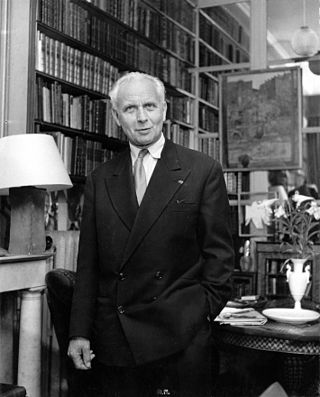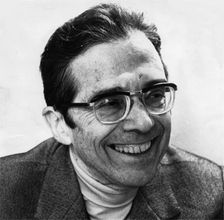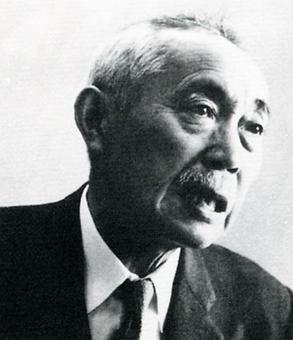Related Research Articles

Henri Barbusse was a French novelist, short story writer, journalist, poet and political activist. He began his literary career in the 1890s as a Symbolist poet and continued as a neo-Naturalist novelist; in 1916, he published Under Fire, a novel about World War I based on his experience which is described as one of the earliest works of the Lost Generation movement or as the work which started it; the novel had a major impact on the later writers of the movement, namely on Ernest Hemingway and Erich Maria Remarque. Barbusse is considered one of the important French writers of 1910–1939 who mingled the war memories with moral and political meditations.

Louis Aragon was a French poet who was one of the leading voices of the surrealist movement in France. He co-founded with André Breton and Philippe Soupault the surrealist review Littérature. He was also a novelist and editor, a long-time member of the Communist Party and a member of the Académie Goncourt. After 1959, he was a frequent nominee for the Nobel Prize in Literature.

Panait Istrati (Romanian:[panaˈitisˈtrati]; sometimes rendered as Panaït Istrati; was a Romanian working class writer, who wrote in French and Romanian, nicknamed The Maxim Gorky of the Balkans. Istrati appears to be the first Romanian author explicitly depicting a homosexual character in his work.
Le Nouvel Obs, previously known as L'Obs (2014–2024), Le Nouvel Observateur (1964–2014), France-Observateur (1954–1964), L'Observateur aujourd'hui (1953–1954), and L'Observateur politique, économique et littéraire (1950–1953), is a weekly French news magazine. Based in the 2nd arrondissement of Paris, Le Nouvel Obs is one of the three most prominent French news magazines alongside Le Point and L'Express. Its current editor is Cécile Prieur.

L'Express is a French weekly news magazine headquartered in Paris. The weekly stands at the political centre-right in the French media landscape, and has a lifestyle supplement, L'Express Styles, and a job supplement, Réussir. Founded in 1953 by Jean-Jacques Servan-Schreiber and Françoise Giroud, L'Express would be considered France's first American-style news weekly. L'Express is one of the three major French news weeklies alongside Le Nouvel Obs and Le Point.

Claridade was a literary review inaugurated in 1936 in the city of Mindelo on the island of São Vicente, Cape Verde. It was part of a movement of cultural, social, and political emancipations of the Cape Verdean society. The founding contributors were Manuel Lopes, Baltasar Lopes da Silva, who used the poetic pseudonym of Osvaldo Alcântara, and Jorge Barbosa, born in the Islands of São Nicolau, Santiago and São Vicente, respectively. The magazine followed the steps of the Portuguese neorealist writers, and contributed to the building of "Cape Verdeanity", an autonomous cultural identity for the archipelago.

Henri Curiel was a left-wing political activist in Egypt and France. Born in Egypt, Curiel led the communist Democratic Movement for National Liberation until he was expelled from the country in 1950.
Jeune Afrique is a French-language pan-African weekly news magazine, founded in 1960 in Tunis and subsequently published in Paris by Jeune Afrique Media Group. It is the most widely read pan-African magazine. It offers coverage of African and international political, economic and cultural news. It is also a book publisher, under the imprint "Les Éditions du Jaguar".
Courrier International is a Paris-based French weekly newspaper which translates and publishes excerpts of articles from over 900 international newspapers. It also has a Portuguese and a Japanese edition. Courrier Japon was launched on 17 November 2005 and is published by Kodansha Limited.

René Depestre is a Haitian-French poet and former communist activist. He is considered to be one of the most prominent figures in Haitian literature. He lived in Cuba as an exile from the Duvalier regime for many years and was a founder of the Casa de las Américas publishing house. He is best known for his poetry.

Francis Jourdain was a French painter, furniture maker, interior designer, maker of ceramics, and other decorative arts, and a left-wing political activist.

Ōmi Komaki was the pen-name of a scholar and translator of French literature in Taishō and Shōwa period Japan. His real name was Komaki Ōmiya.

Under Fire: The Story of a Squad by Henri Barbusse, was one of the first novels about World War I to be published. Although it is fiction, the novel was based on Barbusse's experiences as a French soldier on the Western Front. It was awarded the Prix Goncourt in 1916. The novel is described as one of the earliest works of the Lost Generation movement or as the work which started it; the novel had a major impact on the later writers of the movement, namely on Ernest Hemingway and Erich Maria Remarque.

The Union of Communist Students is a French student political organization, part of the Mouvement Jeunes Communistes de France. It was founded in 1939 but dissolved after World War II. The UEC was re-created in 1956, along with the MJCF. It is independent from the French Communist Party (PCF) although it remains close to it. It maintains exchange contacts with the PCF, in particular on student issues. The UEC is organized in sectors, by university, and is led by a national collective elected during the congress of the MJCF and renewed during the National Assemblies of the facilitators, every year. A national coordination runs the organization.

Magdeleine Paz was a French journalist, translator, writer and activist. She was one of the leading left-wing intellectuals in the interwar period. For a time she belonged to the French Communist Party, but she was expelled due to her support of Leon Trotsky. She was the driving force in the campaign to have Victor Serge released from prison in Russia and allowed to return to the west. She wrote a number of books, and translated several others.
The World Committee Against War and Fascism was an international organization sponsored by the Communist International, that was active in the struggle against Fascism in the 1930s. During this period Adolf Hitler came to power in Germany, Italy invaded Ethiopia and the Spanish Civil War broke out. Although some of the women involved were Communists whose priority was preventing attacks on the Soviet Union, many prominent pacifists with different ideologies were members or supporters of the committee. The World Committee sponsored subcommittees for Women and Students, and national committees in countries that included Spain, Britain, Mexico and Argentina. The Women's branches were particularly active and included feminist leaders such as Gabrielle Duchêne of France, Sylvia Pankhurst of Britain and Dolores Ibárruri of Spain.
Tane maku Hito was a Japanese proletarian literary magazine in the early 1920s.
Harold J. Salemson was a correspondent for newspapers, a film and book critic, as well as a publisher, editor, and translator. He served in the U.S. Army during World War II. He was put on the Hollywood blacklist for alleged past involvement with the Communist Party and Communism.
The Henri Barbusse Battalion was a French International Brigade battalion during the Spanish Civil War. The Battalion served in the XIV International Brigade. It was named after French communist and writer, Henri Barbusse, who died in 1935.

La Voix des femmes was a "political, social, scientific, artistic" weekly newspaper, founded in 1917 by Colette Reynaud and Louise Bodin, the first issue of which was published on October 31, 1917. The newspaper, which proclaimed itself in 1919 as "feminist, pacifist, socialist and internationalist", appeared until 1937.
References
- ↑ Richard Abel (1993). French Film Theory and Criticism: 1907-1929. Princeton University Press. p. 322. ISBN 0-691-00062-X . Retrieved 21 April 2015.
- ↑ Douglas W. Alden (1 August 1994). French Twentieth Bibliography. Susquehanna University Press. p. 13968. ISBN 978-0-945636-68-7 . Retrieved 21 April 2015.
- 1 2 3 4 Guessler Normand (July 1976). "Henri Barbusse and His Monde (1928-35): Progeny of the Clarte Movement and the Review Clarte". Journal of Contemporary History. 11 (2–3): 173–197. doi:10.1177/002200947601100210. JSTOR 260256. S2CID 161521783.
- 1 2 Ludmila Stern (17 October 2006). Western Intellectuals and the Soviet Union, 1920-40: From Red Square to the Left Bank. Routledge. p. 52. ISBN 978-1-134-23867-5 . Retrieved 21 April 2015.
- ↑ Mariano Azuela; Gustavo Pellon. The Underdogs: with Related Texts. Hackett Publishing. p. 101. ISBN 1-62466-011-8 . Retrieved 21 April 2015.
- ↑ A Kind of Compulsion (1903–36), p.113